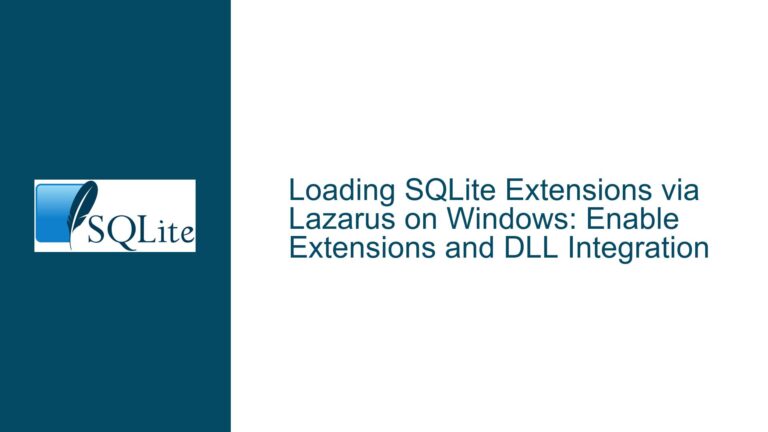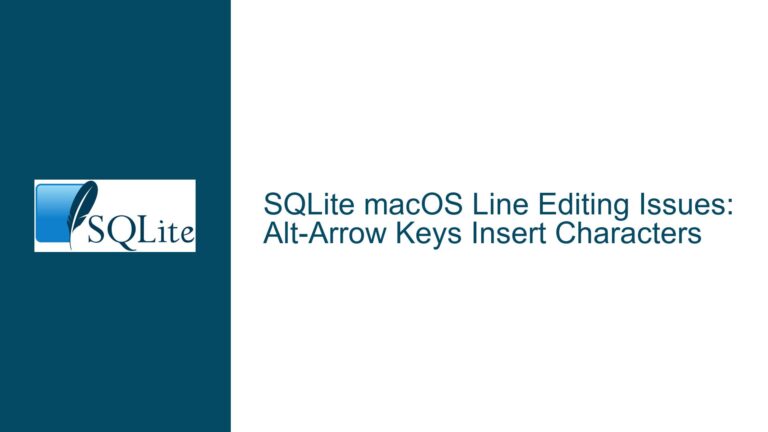SQLite Compiler Errors with LL Suffix in Long-Long Integer Literals
SQLite Compiler Errors Due to LL Suffix in Long-Long Integer Literals
The core issue revolves around the use of the "LL" suffix in long-long integer literals within the SQLite source code, specifically in the amalgamation file sqlite3.c. This suffix, which is used to explicitly denote a long-long integer constant, causes compilation errors in older compilers such as Microsoft Visual Studio 6.0 (MSVC 6.0). The error message generated is C2059: 'bad suffix on number', which indicates that the compiler does not recognize the "LL" suffix as valid syntax for integer literals.
The problem is particularly evident in four specific lines of the sqlite3.c file, where long-long integer literals are used with the "LL" suffix. These lines are critical for certain operations within SQLite, such as range checking and arithmetic operations involving large integers. The issue is compounded by the fact that SQLite is designed to be highly portable, and the use of the "LL" suffix, while standard in modern C compilers, is not universally supported across all compiler versions, especially older ones like MSVC 6.0.
The discussion also highlights a historical context where a similar issue was addressed in a previous SQLite commit, which aimed to avoid the use of the "LL" suffix altogether. However, the current version of SQLite reintroduces this suffix, leading to compatibility issues with older compilers. This reintroduction suggests that the "LL" suffix was deemed necessary for some compilers, as its absence could also cause problems, particularly in ensuring that large integer constants are correctly interpreted as long-long integers.
Interrupted Write Operations Leading to Index Corruption
The primary cause of the issue lies in the incompatibility between the "LL" suffix and older C compilers, specifically MSVC 6.0. The "LL" suffix is a standard way to denote long-long integer literals in modern C compilers, but MSVC 6.0, which was released in 1998, does not support this syntax. This incompatibility arises because the C standard at the time of MSVC 6.0’s release did not include the "LL" suffix as part of the language specification. As a result, when the SQLite source code is compiled with MSVC 6.0, the compiler encounters the "LL" suffix and generates a syntax error.
Another contributing factor is the historical evolution of the C language and its compilers. Over time, the C standard has evolved to include new features and syntax, such as the "LL" suffix, to support larger integer types like long long int. However, older compilers like MSVC 6.0 were not updated to support these new features, leading to compatibility issues when modern code, such as SQLite, is compiled with these older tools.
The issue is further complicated by the fact that SQLite is designed to be highly portable, meaning it should compile and run correctly on a wide range of platforms and compilers. This portability requirement often necessitates the use of compiler-specific preprocessor directives and conditional compilation to handle differences between compilers. In this case, the lack of such conditional compilation for the "LL" suffix in the SQLite source code leads to compilation errors on older compilers.
Additionally, the discussion points out that the absence of the "LL" suffix can also cause problems in some compilers, particularly in ensuring that large integer constants are correctly interpreted as long-long integers. This dual nature of the problem—where both the presence and absence of the "LL" suffix can cause issues—highlights the challenges of maintaining compatibility across a wide range of compilers and platforms.
Implementing Conditional Compilation and Macro Definitions for Integer Literals
To address the issue of compiler errors caused by the "LL" suffix in long-long integer literals, several solutions and fixes can be implemented. These solutions aim to ensure that SQLite remains compatible with both modern and older compilers, while also maintaining the correctness and portability of the code.
Conditional Compilation Based on Compiler Version
One approach is to use conditional compilation to handle the "LL" suffix based on the compiler being used. This can be achieved by using preprocessor directives to check the compiler version and define the appropriate suffix for integer literals. For example, the following code snippet demonstrates how to define a macro that conditionally adds the "LL" suffix based on the compiler:
#if defined(_MSC_VER) && _MSC_VER < 1300
#define LL(x) (x)
#else
#define LL(x) (x##LL)
#endif
In this example, the macro LL(x) is defined to add the "LL" suffix only if the compiler is not MSVC 6.0 (which has a version number less than 1300). For MSVC 6.0, the macro simply returns the integer literal without any suffix. This approach ensures that the code compiles correctly on both older and modern compilers.
Replacing Magic Numbers with Named Constants
Another solution is to replace the "magic numbers" in the code with named constants, which can be defined in a way that avoids the use of the "LL" suffix. This approach not only improves code readability but also makes it easier to manage the integer literals across different compilers. For example, the following code snippet shows how to define named constants for the integer literals in question:
#define SQLITE_INT64_MAX 9223372036854775807LL
#define SQLITE_INT64_MIN (-9223372036854775807LL - 1LL)
#define SQLITE_UINT64_MAX 18446744073709551615ULL
These named constants can then be used throughout the code instead of the raw integer literals. This approach ensures that the integer literals are correctly interpreted as long-long integers, regardless of the compiler being used.
Using Compiler-Specific Preprocessor Directives
In cases where conditional compilation is not sufficient, compiler-specific preprocessor directives can be used to handle the "LL" suffix. For example, the following code snippet demonstrates how to use preprocessor directives to define the "LL" suffix for specific compilers:
#if defined(_MSC_VER)
#define LL(x) (x##I64)
#else
#define LL(x) (x##LL)
#endif
In this example, the macro LL(x) is defined to add the "I64" suffix for MSVC compilers and the "LL" suffix for other compilers. This approach ensures that the integer literals are correctly interpreted as long-long integers, regardless of the compiler being used.
Manual Modification of the Source Code
For users who are unable to upgrade their compilers or modify the SQLite source code, a temporary solution is to manually modify the affected lines in the sqlite3.c file. This involves removing the "LL" suffix from the integer literals and recompiling the code. While this approach is not ideal, it can be used as a stopgap measure until a more permanent solution is implemented.
Upgrading to a Modern Compiler
Finally, the most straightforward solution is to upgrade to a modern compiler that supports the "LL" suffix. Modern compilers, such as the latest versions of MSVC, GCC, and Clang, fully support the "LL" suffix and other features of the C standard. Upgrading to a modern compiler not only resolves the issue with the "LL" suffix but also provides access to other improvements and optimizations that can enhance the performance and reliability of the code.
Conclusion
The issue of compiler errors caused by the "LL" suffix in long-long integer literals is a complex one, with multiple potential causes and solutions. By implementing conditional compilation, replacing magic numbers with named constants, using compiler-specific preprocessor directives, or upgrading to a modern compiler, developers can ensure that SQLite remains compatible with both older and modern compilers. These solutions not only address the immediate issue but also contribute to the overall portability and maintainability of the SQLite codebase.






